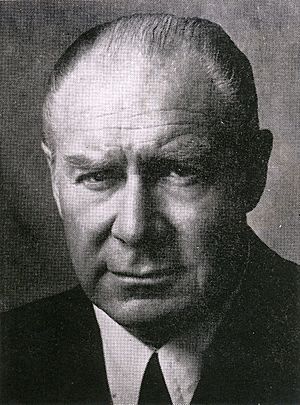Sergio Onofre Jarpa facts for kids
Quick facts for kids
Sergio Onofre Jarpa
|
|
|---|---|
 |
|
| Minister of the Interior | |
| In office 10 August 1983 – 12 February 1985 |
|
| President | Augusto Pinochet |
| Preceded by | Enrique Montero Marx |
| Succeeded by | Ricardo García Rodríguez |
| Member of the Senate | |
| In office 15 May 1973 – 21 September 1973 |
|
| Constituency | LIII |
| In office 11 March 1990 – 11 March 1994 |
|
| Constituency | LV |
| Personal details | |
| Born | 8 March 1921 Rengo, Chile |
| Died | 19 April 2020 (aged 99) Las Condes |
| Political party | Agrarian Labor Party (1950-1958) National Action (1963-1966) National Party (1966-1973) National Labour Front (1985-1987) National Renewal (1987-1997) |
| Spouse | Silvia Moreno Andwandter (1950s-1978; her death) |
| Domestic partner | Mina Huerta Dunsmore (1980s-present) |
| Relations | Onofre Jarpa (ancestor) |
| Children | Sergio Jr., Jorge, Francisco, Isabel |
| Parents | Francisco Javier Jarpa Santa Cruz (father) Raquel Reyes Corona (mother) |
| Alma mater | University of Chile |
| Occupation | Diplomat, farmer |
| Awards | Premio al Mérito Geopolítico (1991) |
Sergio Onofre Jarpa Reyes (born March 8, 1921 – died April 19, 2020) was an important Chilean politician. He served as a government minister during a time when Chile was led by a military government under Augusto Pinochet.
Contents
Who Was Sergio Onofre Jarpa?
Early Life and Education
Sergio Onofre Jarpa grew up in the countryside. He went to the University of Chile where he studied agriculture. This background helped him understand the needs of people living in rural areas.
Starting in Politics
Jarpa began his political journey in the 1950s. He first joined the youth group of the Agrarian Labor Party. Later, he became involved with a group called National Action.
He played a key role in forming the National Party in 1966. This party was often in opposition to the government. Being in opposition means they disagreed with the ruling party's ideas and offered different solutions. From 1971, he was also the editor of a newspaper called Tribuna, which spoke out against socialist ideas.
A Diplomat and Minister
In 1973, Jarpa was elected to the Senate of Chile. The Senate is like a parliament or congress, where laws are made. After a big change in Chile's government in 1973, he became a diplomat. A diplomat represents their country in other nations.
He worked for Chile at the United Nations, an organization where countries discuss global issues. He also served as an ambassador, which is the highest-ranking diplomat, in Colombia (from 1976 to 1978) and then in Argentina (from 1978 to 1983).
In 1983, Sergio Jarpa became the Minister of the Interior. This is a very important job, similar to a country's chief of police and internal affairs. His job included trying to talk with the groups that opposed the government. He held this position until 1985.
Later Political Career
After leaving his ministerial role, Jarpa started his own political group called the National Labour Front. This group later joined with others to form a bigger party called National Renewal in 1987.
He returned to the Senate in 1990, representing this new party. He continued to work for his country in the Senate.
Author and Legacy
Besides his political work, Sergio Jarpa was also a writer. He wrote books and articles about social and political topics. In 1991, he received an award called the Premio al Mérito Geopolítico. This award recognized his contributions to the study of geopolitics, which is about how geography and politics are connected.
His Final Years
Sergio Onofre Jarpa passed away on April 19, 2020. He died from COVID-19 during the worldwide pandemic.
See also
 In Spanish: Sergio Onofre Jarpa para niños
In Spanish: Sergio Onofre Jarpa para niños

